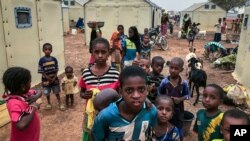The U.S. State Department, saying it was “deeply concerned” about alleged human rights violations by state security forces in West Africa’s Sahel region, warned Thursday that inaction by governments there could jeopardize Washington’s support.
“The United States has made clear that our assistance to the region must not be used in any way that contributes to violations or abuses of human rights, and that without prompt and thorough action to address these allegations, U.S. security assistance may be at risk,” spokeswoman Morgan Ortagus said in a statement.
The statement urged heads of state in the G5 Sahel — representing Burkina Faso, Chad, Mali, Mauritania and Niger — “to follow through” on public commitments made June 30 to investigate such allegations about security forces there. It also called for “ensuring full and public accountability for anyone found guilty” of such violations.
Washington has "obligated approximately $467 million to provide security assistance to the G5 Sahel member states" between fiscal years 2017 and 2019, a State Department official told VOA.
The department's warning referenced a Human Rights Watch (HRW) report released Wednesday that suggested evidence of “government security force involvement in mass extrajudicial executions” in northern Burkina Faso.
The State Department also cited violations reported by the U.N. Multidimensional Integrated Stabilization Mission in Mali (MINUSMA).
Bodies found
HRW reported at least 180 bodies had been found in recent months near the Burkina Faso town of Djibo. Residents told HRW of seeing bodies, in groups of up to 20, “along major roadways, under bridges and in fields and vacant lots.” All were men, many of whom had been blindfolded and their hands bound. Many had been shot. Almost all were found within 5 kilometers of central Djibo from last November through June.
The rights group said town residents reported burying most of the bodies in common graves in March and April.
HRW said in its report that it had written to the Burkinabe government on June 28 to share its findings. It summarized the Defense Ministry’s July 3 response, which included a promise to investigate and to ensure that security troops would respect human rights.
None of the 23 residents interviewed by HRW witnessed the killings, “which appear to have taken place at night,” Corrine Dufka, HRW’s Sahel director, told VOA in an interview Tuesday.
But, she said, “a good number of the residents described hearing shots in the middle of the night and then hearing the sound of heavy vehicles moving back and forth, and then in the morning finding these groups of bodies all over Djibo.”
Jihadi activity
The town is at “the epicenter of activity” by armed Islamists who, since 2016, have been attacking both military and civilian targets, Dufka said.
“Jihadis have concentrated their recruitment on the Fulani or Peul,” ethnic nomadic groups who are largely herders, she said. Witnesses said most of the dead were Peul, “which is to say those that are collectively blamed, collectively identified by the authorities as supporting the jihadis.”
Dufka said that residents who participated in or witnessed the burials in the spring “were expressly told not to carry smartphones, not to take pictures.” She said HRW nonetheless had received “maps and drawings of where bodies were found and where they were buried.”
HRW is analyzing satellite photos, Dufka said, but she acknowledged the need for on-the-ground investigations.
Tibor Nagy, the top U.S. diplomat to Africa, said in a Twitter post that he found the HRW report “very troubling. … Burkinabe authorities must do more to prevent these abuses and hold perpetrators accountable."
VOA State Department correspondent Nike Ching contributed to this report, as did the Africa Division’s Jason Patinkin, Catherine Field and Carol Guensburg.





